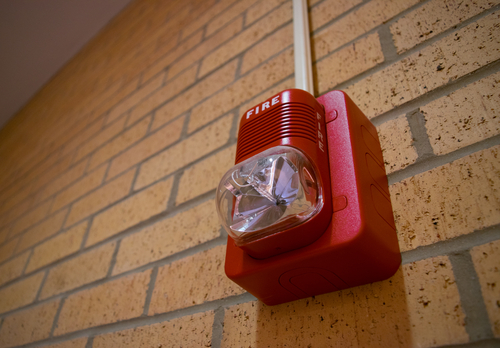As the new school year approaches, thousands of college students nationwide are moving into dormitories and off-campus housing, which can lead to a major rise in campus fire hazards. That means facilities managers should remain vigilant about fire safety and help provide resources to key stakeholders.

Through their annual Campus Fire Safety Month campaign every September, the National Fire Protection Association (NFPA) and Center for Campus Fire Safety (CCFS) have partnered to offer vital fire safety education and resources to students, parents, and campus housing staff and administrators to help make resident living spaces as safe as possible. This year’s campaign highlights the importance of safe cooking practices and lithium-ion battery safety, drawing attention to two significant fire hazards in student residences.
Fire Stats
According to the latest NFPA statistics, U.S. fire departments responded to an estimated annual average of 3,231 structure fires in dormitories, fraternity and sorority houses, and barracks from 2019-2023. These incidents resulted in an annual average of 19 civilian injuries and $19 million in direct property damage. Roughly three out of four fires in these properties started in the kitchen or cooking area, accounting for 58% of civilian injuries and 11% of the direct property damage. Cooking equipment was involved in nearly eight out of 10 fires; unattended equipment was the most common factor contributing to the ignition of these fires.
Cooking Safety
“As students adjust to life on campus, cooking quickly becomes one of the leading daily fire risks,” said Lorraine Carli, vice president of outreach and advocacy at the NFPA and CCFS Advisory Council member. “Unattended cooking and the improper use of kitchen appliances remain the primary causes of cooking fires in student housing. Taking these factors into account, NFPA and CCFS underscore the critical need to develop smart cooking habits as part of this year’s Campus Fire Safety Month campaign.”
NFPA and CCFS offer several tips and resources for cooking safely, including these key messages:
- Stay alert and present. Do not cook if you’re tired or drowsy from medicine or alcohol. Do not leave the kitchen unattended, especially when using the stove or oven.
- Keep flammables away from heat sources. Keep anything that can catch fire—oven mitts, wooden utensils, food packaging, towels, or curtains—away from your stovetop.
- Be prepared for emergencies. Always have a lid within reach to smother small grease fires. If you have any doubt about fighting a small fire, get outside, close the door behind you, and call 911 from outside the home.
Battery Safety
While cooking remains a leading cause of fires in campus housing, there is growing concern on college campuses about the increasing number of fires caused by lithium-ion batteries. CCFS President Alan Sactor highlights the urgency of education around battery and technology use:
“College students rely on technology and micromobility devices like e-bikes and e-scooters and smaller electronics such as cell phones, laptops, and tablets every day, but it’s critical that they know how to use and store them safely,” said Sactor. “The batteries that power these devices can present safety hazards such as overheating, fire, or even explosions. NFPA and the CCFS are working together to help educate all members of the college and university campus community on how to safely use, store, and charge these devices to reduce the risk of fire. Our partnership with NFPA allows us to reach thousands of students with practical steps that help reduce fire risks on and off campus.”
NFPA and CCFS offer tips for safely using, storing, and charging lithium-ion batteries to help prevent fires:
- Buy only listed products. When buying a product that uses a lithium-ion battery, look for a safety certification mark. This means it meets important safety standards.
- Charge devices safely. Only use the charging equipment provided with your device, stop charging once full, and never charge overnight or with damaged chargers/batteries.
- Store devices properly. Keep your batteries away from extreme temperatures, direct sunlight, and flammable items, and never block an exit with charging or stored devices.
For more tips and info about Campus Fire Safety Month, visit nfpa.org/campusfiresafety and the CCFS website.
ALSO READ: Back to Basics: Most Common Fire Safety Code Violations
